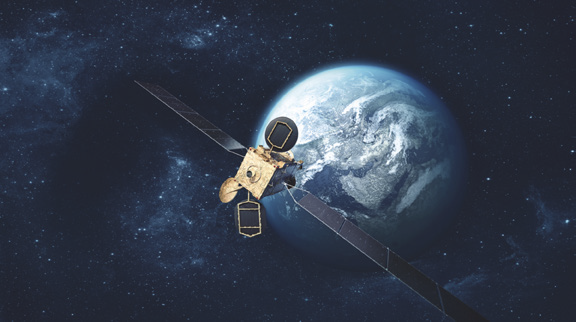Chris Forrester, Senior Columnist
By the time you read this column, is quite likely that Paris-based satellite operator Eutelsat will have a new major investor, possibly even a controlling shareholder.

June 1st saw new CEO Jean-François Fallacher sit at his Eutelsat desk for his new responsibility. He replaced former CEO Eva Berneke on May 5th. A statement on that day said, “Eutelsat announces the appointment of Jean-François Fallacher as its new CEO. The appointment was decided at a Board Meeting held on May 4th, 2025, upon the recommendation of the Nomination and Governance Committee, and will be effective on June 1st, 2025.”
The statement added that this move meant Eutelsat was entering its “next phase after the integration with OneWeb and fully aligned with an IRIS2 future. This appointment comes as a natural change that fully aligns Eutelsat to the telecom ecosystem.”
 This is where the “Woe, woe” expression comes into play. It’s a common way to express deep distress. And ‘deep distress’ is something that Fallacher will have to get to grips with in a hurry.
This is where the “Woe, woe” expression comes into play. It’s a common way to express deep distress. And ‘deep distress’ is something that Fallacher will have to get to grips with in a hurry.
As almost always, the woes concern money, or the ability to borrow money. The pressures are immense, hence our suggestion of a ‘white knight’ galloping in the save the business. The departure of Berneke and the general uncertainty pushed Eutelsat’s share price down 12.5% on that day.
Fallacher will need all his telecoms skills, including his work at two of the top French university schools (Ecole Polytechnique and Ecole Nationale Supérieure des Télécommunications) where—no doubt—the friends he made at the colleges will prove useful.
But first, the woes! Woe #1
OneWeb: This was the merger with, and integration of, OneWeb in 2023 that created the world’s only LEO / GEO satellite operator. What seemed like a grand idea has proven to be a disappointment. Revenue targets are not being met and they are not helped by some important potential markets being extremely slow to grant operational licences to OneWeb. These delays, combined with the challenges of establishing ground teleports at some locations, have not helped the revenue picture. Eutelsat, almost a year ago in August of 2024, said that the slower-than-expected deployment of some OneWeb ground infrastructure was denting sales growth in that fiscal year. It isn’t much better this fiscal (which ends on June 30). For example, India, who has promised and promised to open up for OneWeb capacity and traffic. Despite having India’s giant Bharti Group as a key (24.1%) shareholder, Eutelsat is still awaiting— as of this writing—all the necessary operation licences for OneWeb.
Woe #2
Replacing the aging OneWeb fleet: The first OneWeb satellite was launched on February 27, 2019, (from Kourou in French Guiana). It doesn’t need a mathematician to start worrying about those early satellites starting to decay. Lifespan was initially given as five years. Good on-orbit husbandry can be expected to improve that lifespan somewhat, but science being what it is, Eutelsat needs to start replacing those early launch craft by 2027 and has ordered an initial 100 as replacements. OneWeb has 648 satellites on-orbit and the company is also planning a second-generation constellation that could significantly expand the number of satellites. Berneke, speaking in February of 2024, stressed that the OneWeb satellite were proving extremely reliable, with an on-orbit failure rate below 1%. The initial plan was for Eutelsat to rapidly deploy around 300 second-generation OneWeb satellites in the coming years to replace the existing fleet, with an estimated price tag of €4 billion. However, with the first-generation fleet performing better than anticipated, Eutelsat believed it can trim about 30% from the expected replacement costs by carefully timing investment into new spacecraft.
Woe #3
IRIS2: IRIS², which stands for Infrastructure for Resilience, Interconnectivity and Security by Satellite, is a satellite constellation that is being developed by the European Union (EU). It aims to provide the EU with reliable, secure, and autonomous satellite communication capabilities, including high-speed internet broadband. The project is expected to be fully operational by 2030.
Eutelsat is a key player in the SpaceRISE consortium (with SES and Hispasat) that is responsible for bringing the IRIS2 project to completion. The SpaceRISE parties have made it clear to the European Union that they want a minimum of 10% Return On Investment (ROI).
Eutelsat/OneWeb’s Gen 2 satellites will leverage cutting-edge technologies to slash latency, massively boost data throughput, and enable optical intersatellite links to seamlessly route traffic using lasers.
Eutelsat also plans to incorporate innovations from the European Union’s IRIS2 satellite broadband program into the new OneWeb design to help de-risk technical challenges as the replacement constellation takes shape.
That cash security is urgent. Heavily indebted Eutelsat is seeking a multi-billion loan guarantee from France’s export credit agency in order to fund replacement OneWeb satellites and its forward participation in the IRIS2 mega-constellation scheme.
OneWeb is actually using a combination of British (L5) and French (MCSAT-LEO) filings, but OneWeb will have to stay headquartered outside the EU to leave them eligible to Bpifrance export finance which they already use for their replacement birds.
Meanwhile, Berneke wrote to staff and “partners across the world” on May 5th, saying “Since I took over the CEO position in January 2022, the world has changed in many ways; Russia invaded Ukraine and put geopolitics on the radar for leaders and companies all over the world and the early morning attack on the Viasat satellite—on the day of the Russian invasion—placed SATCOMs, space, and subsequently Eutelsat, in the center of it all.
“The world has changed immensely and so has Eutelsat. We announced the merger with OneWeb in the summer of ‘22 and completed the merger the following year, creating the first LEO-GEO player in the SatCom industry and the only operational LEO constellation operator besides Starlink in the US. New steps were taken in 2024 when Eutelsat joined forces with 2 other operators and won the significant 10,6Bn Euro IRIS2 contract with the EU with the objective of developing a European Sovereign space connectivity capacity and ensuring that Europe remain sovereign and independent—also in Space. In parallel with all of this; Eutelsat’s GEO Tech teams managed no less than five GEO launches.
“And last, but not least, we partially divested our passive ground infrastructure and welcomed EQT as a new investor, and jointly we are now on track to create the world’s first satellite antenna company. “So, looking to the future; Eutelsat is set for a full alignment with a world where Europe is a strong sovereign space player and firmly aligned with the telecom connectivity ecosystem.
So, with Eutelsat’s strategy anchored in the IRIS2 and European sovereign future, we look to adjust our governance and shareholder structure, and this has paved the way for our CEO succession, which will unfold during the next month. Jean-Francois Fallacher will join as Eutelsat’s new CEO on June 1, and I will make sure he gets onboarded with our fantastic teams, our cherished customers, strategic suppliers and regulatory partners.”
Analysts at investment bank BNP-Paribas, in a note following the news that CEO Eva Berneke is to be replaced, said that the company’s guidance that reaffirmed the previous expectations for the year’s trading—which ends on June 30 —s good news. Eutelsat will report on its Q3 numbers after the market closes on May 15th.
Nevertheless, Sami Kassab, research analyst at the bank, pulled no punches in saying that Eutelsat faces “significant requirements” to fund OneWeb Gen 2 [satellites] coinciding with upcoming debt maturities over the next few years. “While in the medium to long term, OneWeb could drive double digit revenue growth we believe that balance sheet risk will be a key share price driver in the near term. With higher interest rates for longer we find the current risk/reward profile unattractive.”
But there could be good news, said Kassab. “The commercial success of OneWeb could drive double digit revenue and EBITDA growth in the medium term and may support the shares. Public subsidies to fund OneWeb Generation 2 could also boost the share value.”
Kassab added, “Outgoing CEO Eva Berneke was appointed in January 2022 and is leaving after less than three-and-a-half years at the helm at a time when press reports suggest ongoing difficult discussions with shareholders regarding a capital increase needed to finance €4bn+ of upcoming investments in IRIS² and the OneWeb upgrade. While geopolitical tensions may provide new opportunities for the group (i.e., Eutelsat augmenting its services in Ukraine and Italy), the ability to finance upcoming investments in a minority shareholder friendly way has us remain Underperform after the strong year to date share price performance.”
These worries prompted Kassab’s bank to issue a negative report on Eutelsat, and a price target for the operator’s shares to just €1.
“European satellite operators are likely to face increasingly competitive markets as new LEO (low earth orbit) constellations enter into service in the coming quarters. On 29th April 2025, Amazon started deploying Kuiper with its first rocket launch. On the same day, China’s GuoWang launched the third batch of its 13,000 LEO satellite constellation while only a few hours later SpaceX launched not one but two rockets full of Starlink V2 satellites. We believe capacity supply is likely to continue to increase significantly over the next 18-24 months and this is even before SpaceX manages to fly Starlink V3 on Starship,” said BNP-Paribas.
Then, on May 15th, Eutelsat unveiled its Q3 results. The numbers were as much as expected, but CFO Christophe Caudrelier—handling the event in the absence of a CEO—told analysts that Eutelsat needed a large injection of equity to enable much-needed loans to kick in.
The cash crunch is severe, and the satellite operator needs some €4.7 billion to finance the build-out of its OneWeb fleet and to fund its involvement in the European IRIS2 multi-satellite scheme, where Eutelsat is a key player.
It emerged that Eutelsat has already ordered 100 OneWeb satellites and will need another 340 in order to maintain the fleet until about 203—and at a cost of some €2.2 billion (about $2.5 billion).
Then, at much the same time, Eutelsat has to find another €2 billion for its participation in IRIS2 and the scheme’s low Earth orbiting portion of the planned fleet.
“Our financing plan clearly looking for capital investors. It’s too early to disclose any type of range, but I can say it’s a significant amount,” Caudrelier said.
Eutelsat booked €300 million ($335 million) in revenue in Q3 of its 2024-25 fiscal year, down 1.9% year-over-year. Video saw the largest decline in the third quarter, down 6.4% year-over-year to €152 million ($170 million).
There was more bad news, which might qualify as Woe #4, and a poor contract renewal rate with the U.S. Dept. of Defense (DoD)in the Spring 2025 campaign. Eutelsat renewed 50% of its contract value (vs. a 5-year average of 75-80% and 70% last year) with the DoD. This underpins the idea that the DoD demand is moving away from GEO satellites.
“Management also indicated that it expects Export Credit Financing is unlikely to resolve the liquidity issue the balance sheet is facing and Eutelsat is looking at options to reinforce their capital structure,” said a report. “Eutelsat faces significant investment requirements to fund OneWeb Gen 2 coinciding with upcoming debt maturities over the next few years. While in the medium to long term, OneWeb could drive double digit revenue growth we believe that balance sheet risk will be a key share price driver in the near term. With higher interest rates for longer we find the current risk/reward profile unattractive,” the report added.
But that ‘white knight’ might—by now—have come to the rescue. There have been widespread rumours that France Telecom and/or Orange is considering a significant investment in Eutelsat.
One report said that without that implied investment, Fallacher would never have taken the job of Eutelsat CEO! Time will tell.
 Author Chris Forrester is the Senior Columnist and Contributor for SatNews Publishers and is a well-known broadcasting journalist and industry consultant. He reports on all aspects of broadcasting with special emphasis on content, the business of television and emerging applications.
Author Chris Forrester is the Senior Columnist and Contributor for SatNews Publishers and is a well-known broadcasting journalist and industry consultant. He reports on all aspects of broadcasting with special emphasis on content, the business of television and emerging applications.


